Brett Fallon
President
Recognised by the Australian Government as the industry’s peak body, we unite over 1,000 members across Australia, offering tools, support, and advocacy to advance alpaca farming into a thriving commercial sector.
Join our community and shape the future of alpaca farming with us.
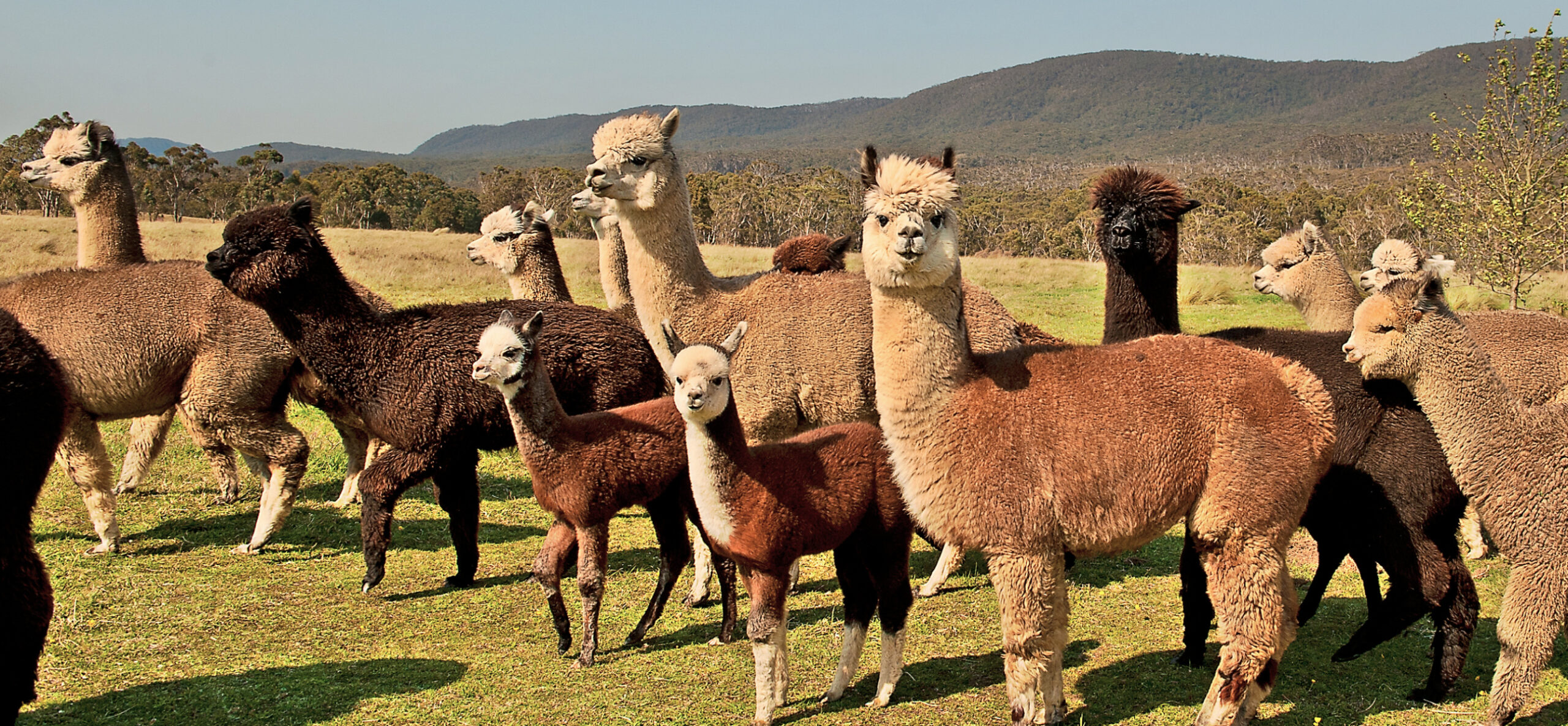
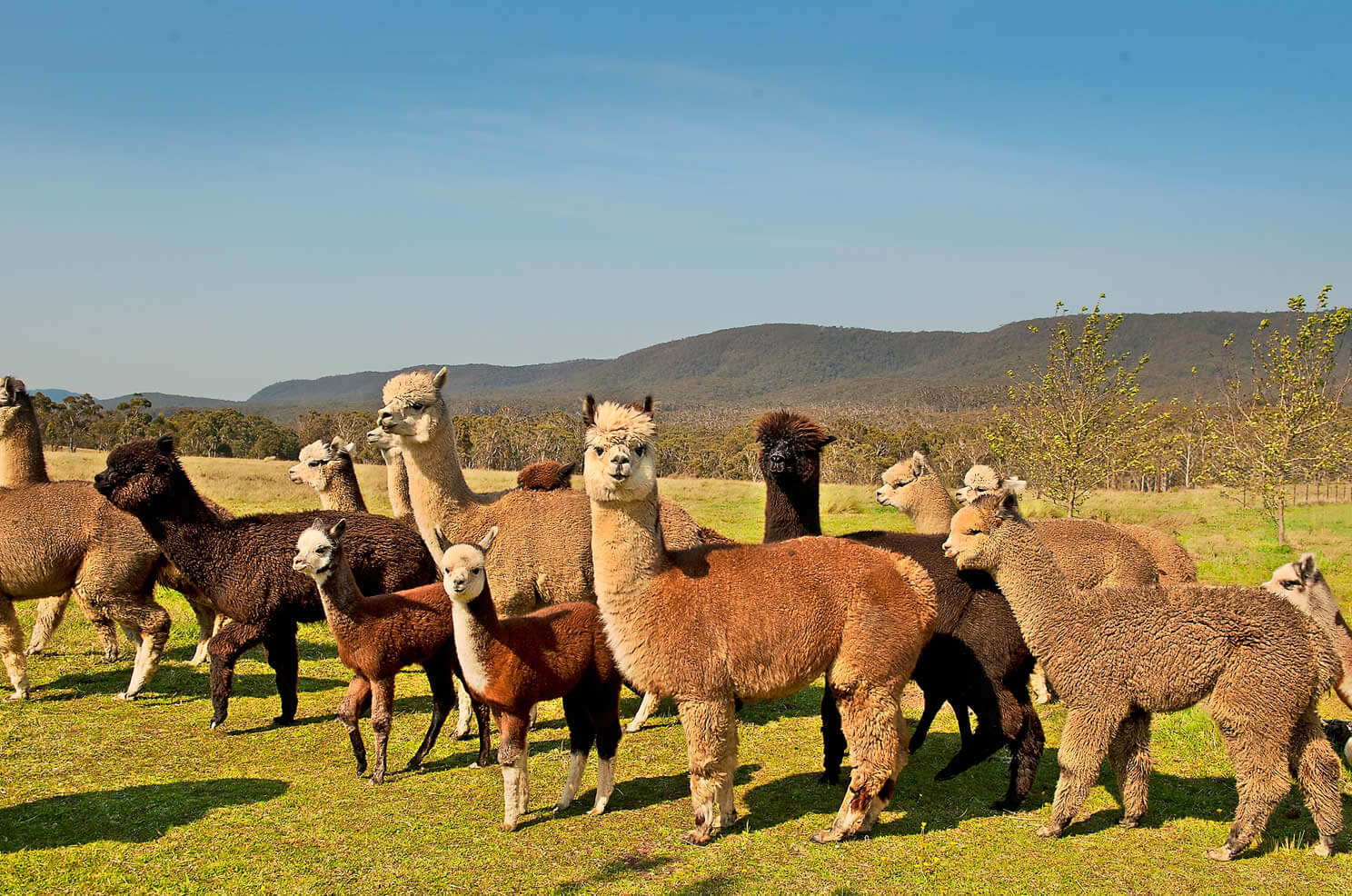
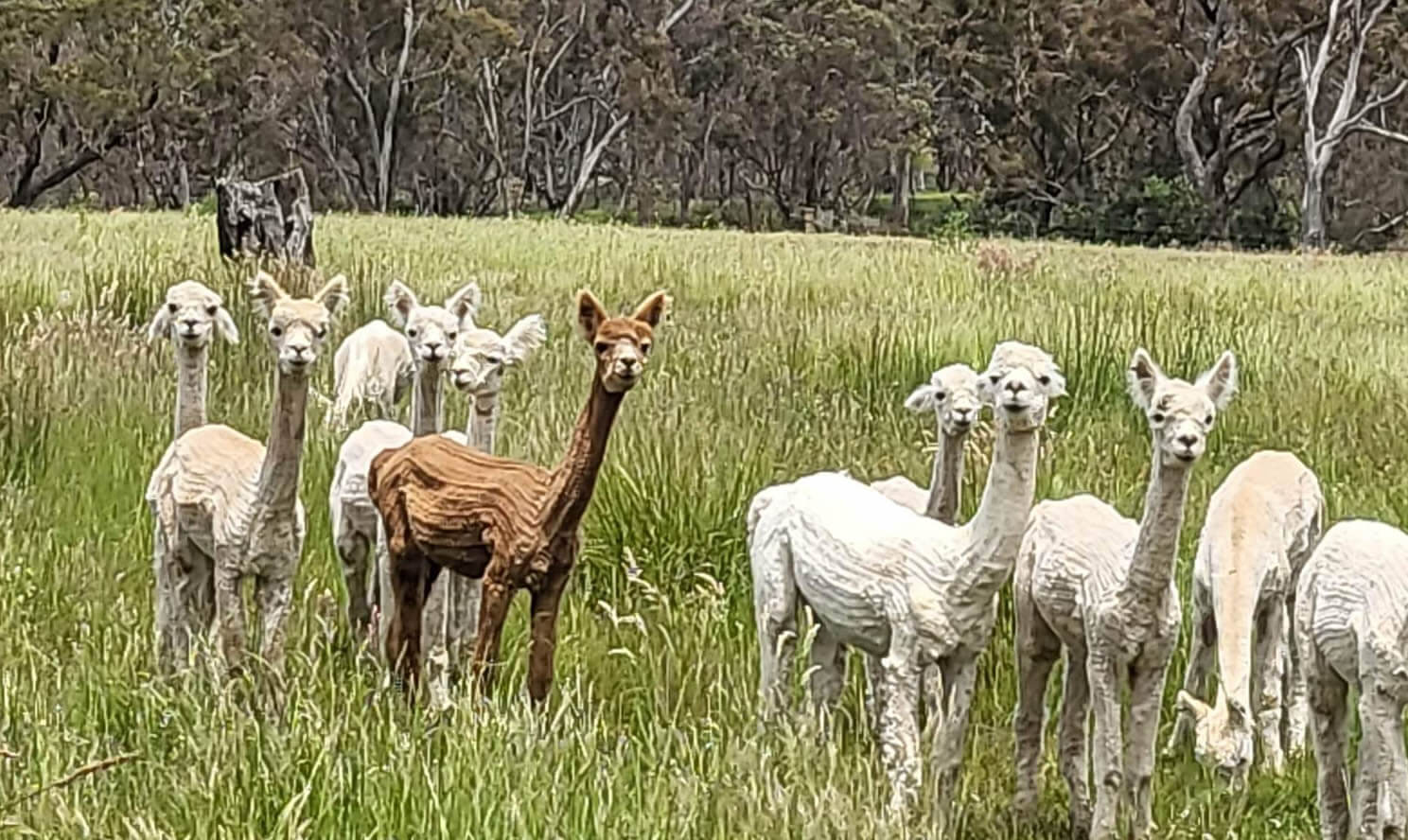
At the Australian Alpaca Association, our mission is to promote and support the alpaca industry across Australia. We are dedicated to ensuring the sustainability of alpaca farming and providing our members with the resources they need to succeed.
To be the leading voice for the Australian alpaca industry, fostering a thriving, innovative, and globally recognised community of breeders and fiber producers. We envision an industry where alpaca farming is both economically viable and environmentally sustainable, with a strong network of knowledgeable and passionate members.
Founded to unite and support alpaca breeders across Australia, our association has played a pivotal role in the industry’s growth. From the introduction of the first alpacas to the country to the development of national breeding standards and fiber testing programs, we have been at the forefront of industry advancements. Today, we continue to build on this legacy, providing our members with the tools and knowledge to succeed in a dynamic agricultural landscape.
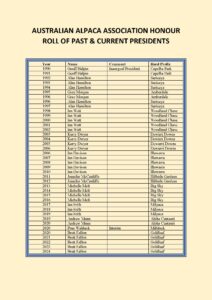
AUSTRALIAN ALPACAS
25 YEARS CHRONOLOGY
| 1983 | Clyde Haldane travels to Chile and Peru to investigate the purchase of alpacas for eventual export to Australia. Over the next several years, Clyde would spend almost half of each year in South America. | |||
| 1985 | 20 August | The NZ Minister of Agriculture changes the status of alpacas and llamas from zoo animals to farm animals because of long-term representations by Ian Nelson of Taupo.
This paves the way for the importation into New Zealand of alpacas direct from Chile and would provide an important steppingstone for the future Australian industry. The actual import permit would not be issued for several months as a protocol with Britain had not been finalized. |
||
| 1986 | 2 June | Two alpacas and three llamas arrive at the Silverstream Quarantine Station in Wellington, NZ after being air freighted from Chester Zoo in England. | ||
| 1987 | January | New Zealanders Alan Laurenson, Mike Lynds, Paul O’Regan, Ron Inglis and Murray Richmond form a Wellington-based syndicate named ARPAC, with ambitious plans to initially import 500 alpacas from Chile.
The scheme fails due to an outbreak of foot and mouth disease in Chile in combination with the stock market crash. |
||
| 1988 | May | The first three alpacas to come into Australia since the days of Charles Ledger arrive at Capalba Park (Seymour, Vic) owned by Geoff and Nancy Halpin after quarantine at Spotswood. The event creates a media sensation, and the Australian alpaca industry has an official start date. | ||
| July | Clyde and Roger Haldane, in partnership with Phil Mizrahie (Pet Centre, US) purchase alpacas in Chile under the trading name of Southern Cross Alpacas.
The Pet Centre had previously made a successful shipment of 300 alpacas to the USA in partnership with Tom Hunt. |
|||
| 8 August | Don Forrest, on behalf of Judith Street of Coolaroo Alpacas, secures the purchase of six alpacas from Anthony Stachowski of Ohio, US. | |||
| September | Alpacas imported by Capalba Park are exhibited at the Royal Adelaide Show. | |||
| November | After seeing alpacas for the first time at the Royal Adelaide Show, Adelaide doctor Franz de Zwart purchases two alpacas (for $40,000 each) from the Halpins. They are sent to Wyona Park near Young, NSW, the property of de Zwart’s daughter and son-in-law, in November. They are the first alpacas to arrive in NSW. | |||
| 25 December | New Zealand public company Agricola Resources purchases 800 alpacas and 150 llamas in Chile. Agricola and the Haldanes form a partnership to arrange a joint importation into New Zealand. Travel by boat takes 26 days, and 29 animals are lost (and 104 cria born) before the Kerry Express docks at Timaru. | |||
| 1989 | March | First alpaca shearing by the Halpins at Capalba Park. [i] | ||
| March | Dispersal of the December 1988 shipment into New Zealand. The Agricola-owned animals are trucked to Rockpool Farm owned by Brian Bassett- Smith, one of the company’s directors. Due to the later financial collapse of major shareholder DFC Ventures, Agricola Resources sells off many of its animals to Australia, Japan and Canada.
The Haldane-owned animals are moved to Waihao Downs Farm, near Waimate. |
|||
| Early May | The first cria is born at the Halpin’s Capalba Park. Stachowski La Anis gives birth to Capalba Park Cuzco, a male, the first alpaca to be born on an Australian farm. | |||
| 15 July | Murray Bruce of NZ Cameloid Imports Ltd imports 273 alpacas into New Zealand from Chile. 100 animals had been pre-sold to MAFTech for research at Tara Hills Research Station. | |||
| September | 100 alpacas imported from NZ by Jolimont Alpacas. | |||
| October | Arrival in quarantine (Spotswood, Vic) of six alpacas (one male, five females) purchased by Coolaroo Alpacas from Anthony Stachowski. | |||
| November | In New Zealand, Pyne Gould Guinness auctions off some of the Agricola Resources animals in Christchurch. They were mostly llamas and guanacos, but included two female alpacas, which were purchased by Australian Cherie Bridges, for $NZ13,500 and $NZ16,000.
Whilst in New Zealand, Cherie Bridges also buys further alpacas from Roger Haldane’s Waihao Downs Farm. |
|||
| 31 December | Arrival at Coolaroo Alpacas, NSW, of shipment of six alpacas from US. | |||
| 1990 | 2 February | Capalba Park Carla (IAR 567), a black female by Stachowski Hercules from Faiks Majorette, becomes the first alpaca to be conceived and born in Australia. | ||
| February | Agricultural Ventures Ltd (Agri Ventures) of Pahiatua brings into New Zealand 284 alpacas from Chile. Agri Ventures is a joint venture between a Chilean exporter and a NZ investment group headed by Peter Johns and Mike MacPherson.
The alpacas, mostly owned offshore, are kept on a Manawatu Farm. 50 alpacas are sold to MAFTech for research at Flock House near Bulls. |
|||
| March | Alan Hamilton air freights 291 alpacas to New Zealand from Chile. They are taken by helicopter to a barge anchored near Soames Island in Wellington Harbour for 60 days of quarantine before being shipped to Christchurch and then to Hamilton’s Loch Maree Farm at Darfield. Hamilton intends to breed from the stock and export to Australia, Canada and the Unites States. | |||
| 1 July | Inaugural General Meeting of the Australian Alpaca Association Inc. Geoff Halpin is elected President. | |||
| 1 August | Arrival of a Singapore Airlines freighter at Melbourne airport with 480 alpacas imported from Chile (via New Zealand) by Clyde and Roger Haldane. It is Australia’s first largest import shipment of alpacas since the Charles Ledger venture of the nineteenth century.
This herd comprises 300 animals selected in Chile as well as their cria and about 100 animals purchased from Agricola Resources in New Zealand after the collapse of DFC. |
|||
| October | Alpacas go to show at Geelong, with Allan and Carolyn Jinks of Benleigh Alpacas displaying their first two animals. | |||
| November | At Loch Maree Farm in New Zealand, 25 alpacas die in mysterious circumstances over a three-month period from November 1990 to February 1991. The deaths are later proven to be caused by a fast-acting poison, but no one is ever charged. The farm is sold in May 1991 and the animals moved south. | |||
| First AAA Conference held, “when the association was a mere five months old”, at Glenormiston College, Victoria, with speakers including US visitors Eric Hoffman (breeder) and vet Dr Brad Smith. | ||||
| 1991 | March-April | Alpacas exhibited at Royal Sydney | ||
| Autumn | First Issue of Alpacas Australia edited by Cherie Bridges | |||
| Peru passes a law regarding the management of all camelids, including legalizing the export of alpacas and llamas and establishing the Council of National Camelids of South America (CONACS). | ||||
| Arrival in Australia of a second Haldane (in association with Alan Hamilton) shipment. 300 alpacas arrive after quarantine in the Cocos islands. They go on to Keith, South Australia for a further quarantine period. [ii] | ||||
| 2nd AAA Annual General Meeting held, Alan Hamilton is elected President and Dianne Condon as Secretary | ||||
| 18 September | First alpaca judging at the Royal Melbourne Show. Inca Black Magic is Senior Champion Male. More than 30 animals were shown in front of a large and enthusiastic crowd. The judge, Dr Walter Bravo from Peru, was impressed with the quality of the animals and was particularly taken with the high quality of the fibre in the top animals. | |||
| 3 November | 1st “Alpaca Classic” Auction at Dalgety’s Oaklands Junction complex near Melbourne. The top selling lot is Coliban Valley Tabatha and cria at $30,000. See b/w photo page 12 Alpacas Australia, Winter 1992. 21 lots brought $445,000. | |||
| 1992 | 13th January | A shipment of 288 alpacas (including 40 suris) and 40 llamas arrive in New Zealand from Chile on behalf of Invercargill-based Alpaca Corporation (The parties involved in the shipment were Rob Orchard, Steve Jenkins, Brian Vidler, Jurgen Shultz and Tom Hunt.) The project has taken 4 ½ years to this point.
The travel period was nearly 12 months due to long periods of quarantine in Chile, Soames Island and Christchurch. Alpaca Corporation chartered a DC-8 from Florida Air West which flew the animals to Christchurch and then immediately to Wellington. Four animals had a very low-grade positive antibody resulting in 10 foot and mouth tests being carried out during their time in quarantine- they were then destroyed. The animals are agisted at Oxford and then moved to Rob Orchard’s Mayfield property, Glencol Alpaca and Llama farm. From this herd, alpacas were sold to Alan Hamilton and Wendy Billington in Australia and 40 exported to the USA. A few were sold to local breeders. |
||
| 16 April | Alpaca judging at Royal Sydney Sow. Promotional stand operating. | |||
| May | 18 alpacas exported to US, the first ever export of Australian-born alpacas. “Since then, about 240 alpacas have moved from Australia to new homes in the US, including Alaska.” (See Exports to North America Thrive by Carolyn Young, Stock Air Transport Alpacas Australia, Vol 1 p18 Autumn 1992)
One of these was Purrumbete Welcome Stranger which had been sold to the BBSS Syndicate (headed by Bruce Barr) from the US at the “Alpaca Classic” auction the previous November. |
|||
| 11-12 July | AAA Seminar at Tocal College (Maitland) “sold out” | |||
| In the US, the first “Alpacafest International” is held over five days at Northwest Alpacas (Mike Safley). The event is organised by the American Owners and Breeders Association (AOBA) and attended by several Australian enthusiast, including Allan and Carolyn Jinks of Benleigh Alpacas. | ||||
| 17-18 July | Alpaca display at Mudgee Small Farm Field days | |||
| 18-22 July | Alpaca judging at Melbourne Sheep Show | |||
| 9 August | 3rd AAA Annual General Meeting held at Albury. Alan Hamilton is re-elected President. | |||
| 1 September | First (later amended) cutoff date for initial registration of alpacas in Australia.
“As from 1 September 1992, all alpacas must be registered. When you buy animals, please check they have been registered…” [iii] |
|||
| October | “The Geelong Show in October included the largest showing of alpacas so far seen in Australia. The 12 breeders from as far afield as Mt Gambier and the Yarra Valley paraded 49 alpacas.” Judge: Geoff Halpin
“A good example … is the newly formed Geelong region. … Its members’ efforts made the Geelong Show the largest alpaca judging show the industry has seen to date. There were more entries than the Royals in either Melbourne or Sydney.” AAA Magazine Summer 1992-93 |
|||
| October | Gourmet and Fashion 2002 seminar at Stonyfell Winery, SA features alpaca garments and industry address by Cherie Bridges. Extensive local and national media coverage – 200 attend. Managed by the SA Division of Animal Industries and Analytical Services, the organising committee includes Margaret de Zwart, Trudi and Keith Barnett and Lyn Shepherd. Ostrich, Emu, Deer, Goat, Alpaca, Oyster and Yabby industries involved. | |||
| Late | “The AAA committee believes the industry and the association are now at a size which justifies the formation of three regions in south-eastern Australia.
Details of the regions – Eastern, Central and Western – will be finalised by March. As numbers warrant, more regions will be formed.” [Quoted in Summer 1992-93 Edition of Alpacas Australia] |
|||
| November | Shipment of 200 alpacas arrives from Chile via Cocos Islands. Buying party led by Laurie Harrison and included Ross Moorhouse (NZ Dept of Agriculture), Lyle Wykes (Mudgee woolgrower) and Ben Ensor (New Zealander – export licence holder). | |||
| November | 2nd Dalgety Classic Auction. Andrew Sloan (Dalgety stud stock auctioneer): “For a sale that was nearly cancelled through lack of numbers, the prices paid on the day were certainly greater than those on offer in current private sales.
8 mated females to $27,500, averaged $22,812 5 open females to $31,000, averaged $23,400 4 weanling pairs to $35,000, averaged $26,000 3 males to $37,000, averaged $24,166 Sale gross; $476,000 20 head to $37,000, averaged $23,800 Top priced male ($37,000) Aztec Gold from Suricaya Stud, Tocumwal NSW sold to Pengelly Alpacas, Kyneton, Vic Top priced female ($31,000) Aymara Lucy from Aymara Stud, Echuca, Vic sold to B & K Gursansky, SA [This female had been the cria at foot of the $30,000 purchase at the same auction 12 months earlier] Top priced weanling pair ($35,000) from Benleigh Stud, Geelong Vic to Windsong Valley, WA” |
|||
| 1993 | First Jolimont shipment from Chile comprises 320 alpacas and over three tonnes of fleece. | |||
| 27 February | Lucindale Show, SA, Alpaca Fleece Competition | |||
| February | Geelong regional meeting. Alan Jinks President | |||
| First judging school held at “Purrumbete”, Camperdown, Vic, the property of Roger and Susan Haldane. Instructors were Roger Haldane, Alan Hamilton, Geoff Halpin, Darryl Bishop and Ian Bucknell. The aim is “to establish consistency in judging and enable the Association to recommend suitable judges for all levels of shows.”
Initial judging criteria are established: 65% fleece characteristics 30% conformation 5% presentation Grade 1 accreditation is given to: Cherie Bridges, Andrew Caldwell, Dianne Condon, Allan Junks, Kelvin Maude and Kevin Rubie. Grade 2 accreditation to: Irene Allston, Aloha Barnes, Bill Robbins and Peter Williams. |
||||
| 13-14 March | St Ives (NSW) Show with alpaca display | |||
| 20 March | Mt Pleasant Show, SA, “Alpaca feature classes… | |||
| April | Coolaroo Vira Cocha sold by Coolaroo Alpacas for $40,000, highest price paid at auction to date for an alpaca. | |||
| May | Peruvian Legacy Sale held at Charlevoix, Michigan (US) | |||
| Winter | Stud Suri “Che” advertised by Cherie Bridges as the first suri male at stud in Australia… Available from October | |||
| 10-11 July | 3rd Annual Alpaca Industry Seminar, Roseworthy Agricultural College, South Australia. Keynote Speaker Dr Murray Fowler Author of Medicine and Surgery in South American Camelids. Other presenters included: Raul Ponzoni, Principal Research Scientist (Genetics) with Primary Industries (SA) and Chris Tuckwell, Livestock Officer for Developing Industries with SA Department of Agriculture.
As a by-product, the Llama Association of Australia is established with the support of the AAA. Initial President is Gary Grealy, and the Secretary is Nerida Aldred. It is at this seminar that Alan Hamilton introduces the concept of the Alpaca Fibre Co-Op “he was hopeful of a majority support for the idea, but even he was overwhelmed by the 100% support given by every attendee …” [iv] |
|||
| 17-20 July | Melbourne Sheep and Wool Show at Royal Melbourne Showgrounds. “The show is the largest of its type in the world…” “Last year conditions were a little cramped, so the show committee has offered the association the larger Federation ring for the judging…” | |||
| 4th AAA Annual General Meeting, Alan Hamilton re-elected President | ||||
| 1 October | IAR closed to “foundation” alpacas | |||
| 6-7 November | [quoted in Summer 1992-93 Edition of Alpacas Australia] Dalgety Classic Auction to be held at Oaklands Junction, Melbourne and include one-day alpaca judging event, classic auction and gala dinner. In AA “will be our inaugural AAA National show and sale.” 1% auction proceeds to go to AAA. | |||
| 1994 | H-BM 1st Annual Alpaca Fest at Butterfly Farm, Wilberforce. | |||
| May | 1st Town & Country Farmer Premier Alpaca Auction at Mudgee | |||
| May | Peruvian Elite Sale held at Charlevoix, Michigan US. Laurie Harrison establishes a world record by paying $US105,000 for a male. Over $US10 million in sales overall. | |||
| 5th AAA Annual General Meeting held; Gray Morgan is elected President. Roger Haldane, Janet Sutherland, Peter Nicholas and Dougal MacDonald stood aside from the Committee.
“This year, every member of the committee will be asked to be responsible for a particular area or sub-committee and report to National Committee meetings …. The future of our industry is dependent on maintaining the integrity of our leadership and harmony within our ranks. We see too many breed societies rendered ineffectual by infighting and factionalism. It would be sad to see all the excellent groundwork done thus far undone by senseless and divisive actions motivated by petty state rivalries.” Sandra Keane’s Secretary’s Report in AAA Newsletter 10 October 1994. |
||||
| 12-13 November | National Show and Sale at Dalgety’s Oaklands Junction complex (Melbourne).
$1,000 prize for best wether and the “Ledger Cup” for the Grand Champion. |
|||
| 1995 | Royal Sydney with 135 alpacas entered by 52 exhibitors. Allan Jinks judge and Cedar House Iceman champion. | |||
| Jolimont Alpacas establishes the first protocol for import of alpacas to Australia from Peru. | ||||
| “Regional shows have attracted good numbers of alpacas: 80 at Berwick; 90 at Lilydale; 81 at Packenham; and 59 at Red Hill. Red Hill was a ‘first appearance’ venue for alpacas; as were Kingston, Ballarat and Portland. – AAA Magazine Winter 1995 | ||||
| 2 April | AAA General Meeting in Sydney. First GM where postal ballot used. | |||
| 23 April | Coolaroo auction. Average $23,857. Top price $30,500 for weanling female Coolaroo Flower Girl, highest price paid at Coolaroo auction to date. | |||
| 7 May | H-BM 2nd Annual Alpaca Fest at Butterfly Farm, Wilberforce. | |||
| 13-14 May | 2nd Town & Country Farmer Premier Auction. $17,500 paid for a 15-month-old black male from Aymara Alpacas and $28,000 for a 15-month-old female from East Station Alpacas (East Station Ebony) | |||
| 7-9 July | Senior Animal Scientist with Vic Dept of Agriculture Bruce McGregor’s paper to “Cria to Criation” AAA 1995 International Industry Seminar, presents first progress results on study into alpaca fibre quality. Guest speakers included Dr Walter Bravo (USA) and Robert Weatherall (Alpha Tops, Bradford, UK) – see AAA Magazine Winter 1995 | |||
| 8 July | Australian Alpaca mark launched, with official speech by Chris Williams. AAA President Gray Morgan presented with full colour prints of the three marks. | |||
| August | Jolimont Alpacas’ first Peruvian importation (how many animals?). | |||
| 27 August | 6th AAA Annual General Meeting held at Moonee Valley racecourse. Gary Morgan is re-elected President. | |||
| Carolyn Jinks elected President of Western Victorian Region | ||||
| Nambour Show, first time alpacas shown in Queensland. | ||||
| 22 October | Vic Central’s 3rd Annual Expo with Mike Safley (US) as judge | |||
| 4-5 | Judges school is held at the University of Western Sydney. 12 candidates were accepted. | |||
| 11-12 November | The 2nd National Classic Show and 4th National Classic Auction were held at the William Inglis Newmarket Auction Complex at Randwick, Sydney. Maggie Kreiger judges 141 animals and Cameron Holt 88 fleeces.
Purrumbete Brigantine wins Supreme Championship and Lambert Lodge Coco is awarded Supreme Champion Fleece. At the National Auction, the top prices paid (by Windsong Valley Alpacas, WA) are for suris: $29,000 for Suricaya Paladin and $33,000 for Benleigh Bronwyn, the latter a pregnant female. Total sales amounted to $528,000. |
|||
| First showing of alpacas at Royal Adelaide Show. 34 alpacas in 8 classes are judged by Kevin Rubie. The Grand Champion is Ambersun Remington. Opened by SA Region President Peter Close. | ||||
| 1996 | 23 February | Inaugural alpaca judging at the Royal Canberra Show. 37 animals and 19 fleeces are entered and judged by Geoff Halpin. Sedona Lodge Moab, exhibited by Sue-Ellen Mays is Supreme Champion. Highland St Luke, exhibited by Richard and Amanda Burrell of Highland Alpacas, wins Supreme Fleece. | ||
| 6-7 July | “Feel the Warmth” Annual Seminar held at Sea World Nara Resort, Queensland. | |||
| 7th AAA Annual General Meeting, Alan Hamilton is elected President, after occupying that position from 1992 to 1994. He takes over from Gray Morgan. | ||||
| 26 October | First alpaca judging at Royal Hobart Show. Geoff Halpin as judge – Supreme Champion Terrabarb Bella also the Senior Female Champion, exhibited by Terry & Barbara Hanlon. (see photo p44 AA Magazine Issue 18) | |||
| October | First alpaca judging at Perth Royal | |||
| 2 November | National Classic Show. Suris judged for the first time, with Champion Suri going to Peruvian Emperado exhibited by Jindy and Coricancha Alpaca Studs. (see p30 AA Magazine Issue 17 for photos) | |||
| 3 November | National Classic Sale. 13 lots sold at an average of $32,115. Top price to Lot 14 Purrumbete Hot Shot sold by Merungle and Pucara Alpaca studs and purchased by Peter and Margaret Bennett of Heritage Alpacas. The highest ever price at an Australian auction. Also, Lot 2 Purrumbete Portia sold by Shanbrooke Alpacas to Swan Valley Alpacas for $62,000. | |||
| [see AA magazine Issue 18 p33-]
598 alpacas land in Nuie, in the Pacific, at the commencement of a year-long quarantine. This is the first ever privately-owned overseas quarantine station (POOQS), developed by Alan Hamilton, and Cherie Bridges in partnership with the Inca Group of Peru. The need arose from the overbooking of the Cocos Islands facility and was supported by AQIS. |
||||
| 1997 | January | Largest ever single shipment of alpacas arrives (via Cocos Island QS) from Peru as Jolimont Alpacas imports over 660 animals. These alpacas have been sourced from Accoyo, Sollocota and Allianza. | ||
| 7-9 March | Inaugural Royal Farm Expo at Royal Showground, Wayville SA. Launched by RAHS of SA as a showcase for emerging farming industries. | |||
| Appointment of David Johnson as General Manager of AAA. | ||||
| Arrival at Pucara Alpaca stud, Victoria, of Peruvian sires Don Julio, Drambuie and Legend. | ||||
| 4-6 July | International Alpaca Seminar. Novotel Brighton Beach, Sydney. Keynote address by Dr Murray Fowler. Other speakers include Dr LaRue Johnson (US) and Bruce McGregor. | |||
| Elite Fibre Australia Pty Limited formed, financed by the Hamilton-Bridges group. Additional capital to be raised by share issue. | ||||
| 14 August | First ever alpaca judging at Royal Queensland Show, Brisbane “after serving what we called ‘our apprenticeship’ at the Nambour, Beaudesert and Warwick Shows.” 52 alpacas in nine classes; judge Kevin Rubie (Champion Female was Waddamana Acorn – “born and bred in Queensland” – AAA Magazine Summer 1997 | |||
| 14 September | 8th AAA Annual General Meeting. Alan Hamilton is re-elected President, and the AAA launches its internet site. | |||
| September | Board of Alpaca Co-operative resolved to acquire 200,000 – 300,000 shares at $1.00 each (“depending on how much capital could be raised”). | |||
| Sept/October | Alan Hamilton imports over 600 alpacas from Peru. | |||
| October | “News of offer and of formation of Elite Fibre Australia Pty Limited was presented to members at the Co-operative’s AGM.
Hamilton-Bridges invited a small group of people to attend a presentation aimed at raising capital for the new venture … 500,000 $1 shares were subscribed” – AAA Summer 1997 |
|||
| The Alpaca Co-Operative is launching its marketing label. [v] | ||||
| 15-16 November | National Classic Show and sale at held at the Exhibition Pavilion, Panthers in Penrith, NSW.
The show attracts 224 entries (25 suris) and 28 fleeces. Judges are Bill Robbins (huacaya), Roger Haldane (suris) and Keith Barnett (fleeces) assisted by Geoff Lenehan. Highlights of the sales include: · Cedar House Kingston (suri male) sold to Jack Hollinger of Bella Vista Alpacas for $48,000. · Purrumbete Angel Face (with her female cria Messmate Whitie Mahogany) sold by John & Jo Freudenstein of Messmate Alpacas to Chic & Jo Wilson of Noosa Alpacas for $40,000 Just prior to the National Sale, the National Show Supreme Champion Shanbrooke High Society is sold privately for $190,000 to Julie and Arthur Mavros (Blue Grass Alpacas). |
|||
| Jolimont Alpacas exports over 100 alpacas to Canada. | ||||
| 1998 | 9th AAA Annual General Meeting held; | |||
| Adoption of new AAA logo | ||||
| 10-12 July | “Crossing the Boundaries” International Alpaca Seminar held at Fremantle. Keynote speakers Dr Deirdre A Bourke (Rowett Research Institute, Scotland), Dr Julie Koenig (camelid researcher, Oregon University), Derek Michell (Michell company, Peru). | |||
| 1999 | 10th AAA Annual General Meeting is held. | |||
| 2000 | Jolimont Alpacas exports 40 alpacas to US. | |||
| 11th AAA Annual General Meeting is held. | ||||
| 2001 | November | Most Valuable Commercial Huacaya Fleece award presented for the first time at the 8th AAA National Show, being won by Blackgate Lodge Sollinca (SW). | ||
| 12th AAA Annual General Meeting is held. | ||||
| 2002 | Third Peruvian shipment for Jolimont Alpacas includes 336 alpacas. | |||
| 13th AAA Annual General Meeting is held. | ||||
| 2003 | Benleigh ‘Sale of the Century’. 22 lots offered on Saturday and 69 on Sunday, grossing over $1 million and including Purrumbete Brigantine (W) being sold to John and Penny Pittard of Currabungla Alpacas, NSW for $145,000, still a record for a private auction. | |||
| 2003 | 14th AAA Annual General Meeting is held. | |||
| 2004 | 8 May | A male alpaca is sold for $US400,000 at auction in Pennsylvania, USA | ||
| 15th AAA Annual General Meeting is held. | ||||
| 1-2 October | First ever alpaca judging at Burnie Show, Tasmania [contact: Therese Badcock] | |||
| November | Inaugural Flowerdale Auction, Victoria | |||
| 2005 | Shanbrooke Alpacas imports (160?) alpacas from Peru. | |||
| Jolimont Alpacas’ fourth Peruvian shipment includes 180 animals. | ||||
| 2008 | 28 – 30 March 2008 | Shear Delight – Sharing the World of Alpacas. First ever World Alpaca Conference held at Cockle Bay, Darling Harbour, Sydney, Australia. | ||
| 2009 | May | First ever National Alpaca Week | ||
| July | AAA fleece scoring system updated and used in a six-month trial | |||
| 9-10 October | 16th AAA National Show and Sale held in Adelaide for the first time | |||
[i] See full story in Town & Country Farmer, Winter 1990.
[ii] See Alpacas Australia, Summer 1992
[iii] See Alpacas Australia, Summer 1992
[iv] See Alpacas Australia, Winter 1993
[v] See Alpacas Australia, Summer 1997
The AAA Board is elected by our members and have the overall governance responsibility of the Association. The business of the Association is governed by the Directors, who have defined duties and responsibilities under the Corporations Act 2001 and the AAA Constitution.

President

President

brett@alpaca.asn.au
2020
Brett has been a member of the AAA since 2001 and operates a stud and commercial breeding herd of huacaya and suri alpaca in Western Australia. He is full-time employed as an Agribusiness Finance Manager and enjoys spending his down time managing the farm with help from his young family.
Brett is passionate about the long-term viability of the alpaca industry in Australia and believes that the Association has an important role to play in this.

Director

Director

2020
Mick has spent almost all this life surrounded by natural fibre, having spent the majority of his formative years on a third-generation merino sheep station outside Inverell. Mick is a full-time Australian commercial alpaca farmer.
With his family, their stud run in excess of 1,000 animals, encompassing 360 degrees of alpaca – show ring, animal sales, fleece, meat, youth development, genetic improvement (SP ratio, phenotype and predictability), research, eco-tourism, cafe/retail outlet, paddock/pasture improvement, export, and international alpaca consulting.
Mick brings a wide range of business skills, academic qualifications and enthusiasm to his role on the Board.
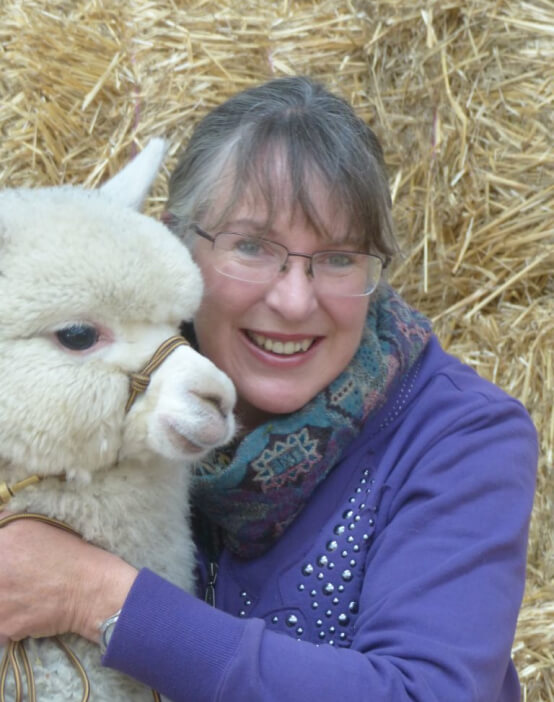
Vice President

Vice President

2020
Lee Sadler has been involved in the alpaca industry for over 20 years. During this time, the Australian alpaca industry has developed from a livestock and breeding focus to a fibre focus. Lee and her family run their stud on the Fleurieu Peninsula in South Australia, where they focus on white huacaya alpaca, with about 300 in their herd. They also have an olive grove and extensive scrub and biodiversity projects on their property.
Lee is a pharmacist by training. Her science background has been useful when assessing health and husbandry matters on the farm. She has been involved in their profession and the alpaca industry in a range of representative roles, contributing on boards, committees and councils across both sectors.
Lee has also participated in the Governors Leadership Foundation Program, run by the Leaders Institute of South Australia. This has afforded her an intensive and rewarding opportunity to consider the breadth and challenges of leadership on many fronts. Lee’s involvement with the Australia College of Pharmacy and the University of South Australia, have also provided the opportunity to develop skills and knowledge in the field of adult education.

Director

Director

Andrew’s Alpaca journey started only 4 years ago when he and his partner relocated from Sydney to the Adelaide Hills. After starting with 4 they have grown their herd to 20 and recently moved to a larger property to support the growth both in numbers and interest. Their Colwood Stud recently won 3 ribbons at the Strathalbyn Show which was an inspiring start.
Andrew’s career spanned 30 years in the Retail / Manufacturing industry where he held CEO roles for some of the most respected Australian and International Brands. Brand Marketing, manufacturing and sourcing of textiles have been at the centre of his career and hopes to bring this experience and knowledge to the Australian Alpaca industry.

Director

Director

Alexandra is passionate about growing organisations with a powerful purpose. Since graduating from Cambridge University, Alexandra has worked in the publishing industry for over twenty years. For the past twelve years she has run global publishing businesses in Australia, and overseas. and she is the founder of a screen and literary agency.
Alexandra is an energetic leader, with experience in diverse areas; from creative vision and concepts, to manufacturing, sales and distribution. She has been a director of boards and is on the Melbourne Executive Committee of YPO (Young President’s Organization). Alexandra brings enthusiasm and commitment to the aims and ambitions of the AAA.

Director

Director

My main motivation to become a director is to be a part of its growth and development into a more Commercially orientated Industry. There are three key facets of a Commercial Industry – Fleece, Meat and Live Export. My 40 years in International Logistics, a Director of an Australian Government approved Live Export Company, founder of LaViande (Alpaca Meat) and as a previous AAA level 1 Judge provides me with a solid background of relevant information to drive this process.
I am the newly appointed Chair of the MATC of the AAA and working towards a direct access to the UK and EU markets whilst still looking at alternate options for other trade lanes. The MATC will also be driving a Fleece single platform and a project to look into ‘like for like’ funding to set up an Export accredited Abattoir.
My vision for the Australian Industry is one of growth. Growth in the areas previously mentioned will involve change. Change in the way we have previously gone about developing the industry, change in a business sense. If the business succeeds its workers succeed! I aim to be a driving force in its change.
With 40 years in a variety of Senior Management roles my philosophy of open communication at all levels has been the backbone of the success I have enjoyed, this wont change. All members will be provided with regular up to date information as to the industry’s move into a more commercially orientated one and at the same time having the current Showing and Judging system enhanced for all members.
My business approach over the years is one of collaboration, you need like minded people around you to be a part of a journey and growth of an Industry. The rewards are the satisfaction in seeing all members benefit from the direction you take them.
Type on the line above then press the Enter/Return key to submit a new search query